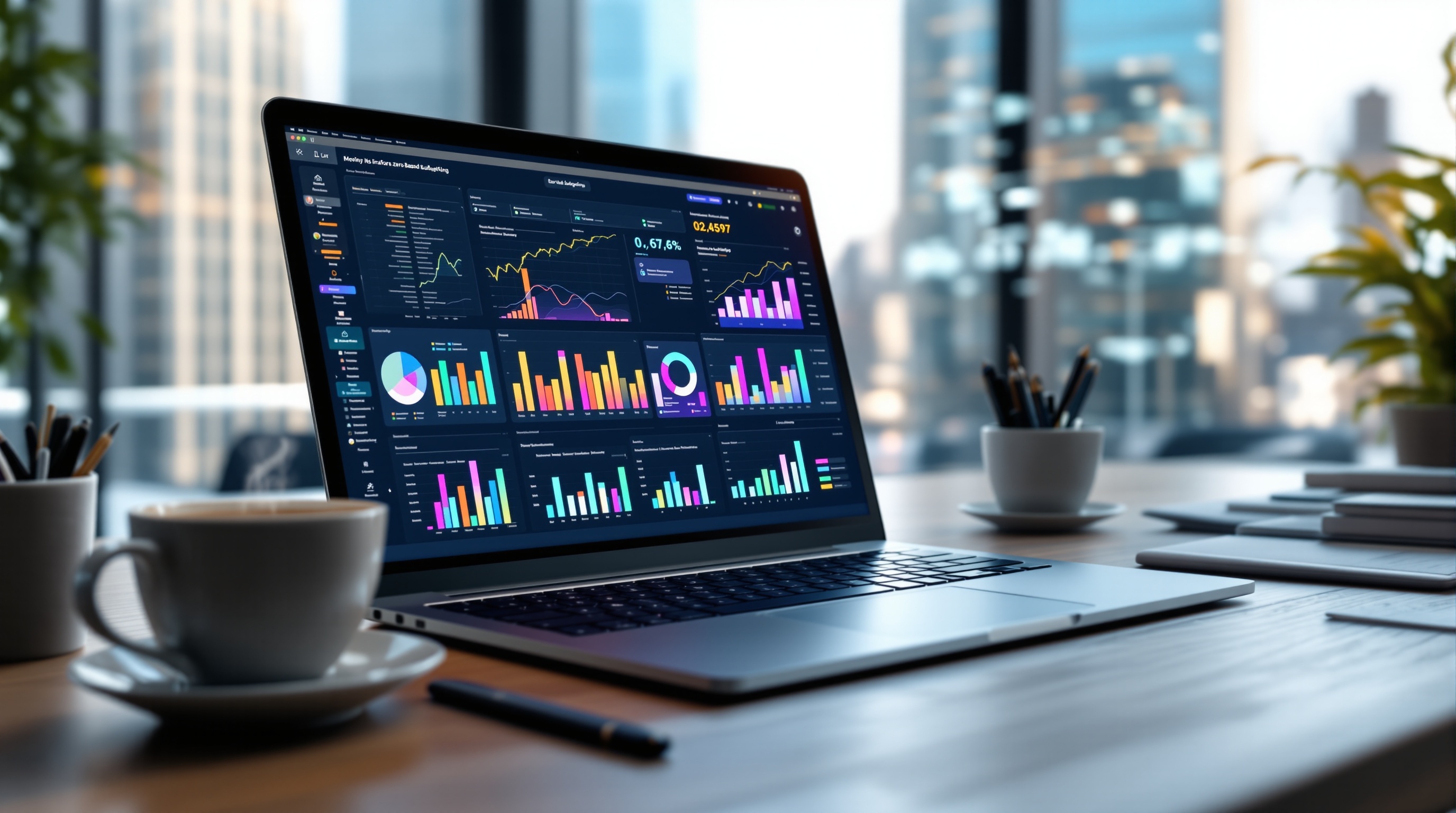Comprehensive Guide to AI Marketing Tracker Generators
Explore AI marketing tracker generators, focusing on hyper-personalization, real-time data, and integration.
Introduction
In the dynamic landscape of 2025, AI marketing tracker generators have emerged as a pivotal tool for modern marketers. By leveraging cutting-edge technologies, these AI-powered solutions facilitate real-time data analysis, hyper-personalization, automation, and predictive modeling, reshaping how businesses approach marketing strategies. According to recent studies, organizations utilizing AI-driven marketing solutions report up to a 30% increase in ROI, showcasing the transformative potential of these tools.
AI marketing tracker generators excel in hyper-personalization by analyzing micro-signals and user behaviors, allowing businesses to craft unique marketing messages tailored to individual consumer needs. For example, a retail company can use AI to predict and advertise new fashion trends to customers before demand peaks. Additionally, real-time predictive analytics enable marketers to dynamically adjust campaigns, optimizing content and spend allocation on-the-fly.
Seamless integration and automated workflow capabilities are other significant advantages offered by these tools. They automate processes from tracking to reporting, reducing manual workload and accelerating campaign launches. For marketers aiming to stay ahead, investing in AI marketing tracker generators is not just an option but a necessity. Begin integrating these advanced tools into your marketing strategies to harness the full potential of AI and achieve unprecedented success.
Background and Evolution
The evolution of marketing trackers has been a fascinating journey, rooted in the fundamental need to understand consumer behavior and optimize marketing strategies. Initially, marketing trackers were simple tools, reliant on basic web analytics and manual data collection processes. These early methods were labor-intensive and often provided delayed insights, limiting their effectiveness in rapidly changing markets.
As digital marketing expanded, so did the complexity and volume of data. The traditional tracking methods struggled to keep pace, giving rise to a shift towards more sophisticated, AI-driven solutions. By 2025, AI marketing tracker generators have become pivotal in transforming how marketers approach data analysis and campaign optimization. According to industry reports, businesses utilizing AI for marketing saw a 40% increase in efficiency and a 30% uplift in ROI compared to those relying on traditional methods.
One of the most significant advancements in AI-powered marketing trackers is hyper-personalization. These tools analyze micro-signals and user behaviors, enabling marketers to deliver bespoke messages and experiences tailored to each individual. Predictive modeling plays a crucial role, with AI anticipated to predict consumer needs before they are even expressed, thus enhancing customer engagement and satisfaction.
Moreover, real-time predictive analytics have revolutionized the field. AI models now interpret vast datasets in real-time, allowing marketers to adjust strategies, content, and spending dynamically to maximize returns. The integration of seamless automation in marketing workflows ensures that campaigns can be launched and optimized quickly, reducing manual labor and increasing speed to market.
For organizations looking to harness these advancements, actionable advice includes investing in AI tools that offer dynamic audience segmentation and automated attribution. These features not only provide deeper insights but also enable continuous optimization of marketing efforts.
In summary, the journey from traditional marketing trackers to AI-driven solutions marks a significant evolution in the marketing landscape. As AI continues to advance, its role in shaping marketing strategies will only grow, making it imperative for businesses to adopt these cutting-edge technologies to stay competitive.
How AI Marketing Trackers Work
In the fast-paced marketing landscape of 2025, AI marketing trackers have become indispensable tools for businesses aiming to stay ahead of the curve. These sophisticated systems operate by meticulously collecting and analyzing vast quantities of data, enabling marketers to make informed decisions and real-time adjustments to their strategies.
Data Collection and Analysis
At the heart of AI marketing trackers lies robust data collection and analysis. These systems gather information from various sources, such as social media interactions, website analytics, email engagement, and more. According to recent statistics, businesses leveraging AI for data analysis have seen a 30% increase in marketing effectiveness [1]. The collected data is then processed using advanced AI algorithms that identify patterns and trends that would be impossible for human analysts to detect efficiently.
For example, AI marketing trackers can analyze micro-signals and behavioral cues to provide hyper-personalized marketing messages. This capability allows businesses to deliver tailored experiences that resonate with individual consumers, often anticipating their needs even before they express them.
Role of AI in Real-Time Adjustments
One of the standout features of AI marketing trackers is their ability to facilitate real-time adjustments. As campaigns unfold, AI models continuously interpret incoming data to predict outcomes and optimize marketing efforts dynamically. This real-time predictive analytics approach ensures that marketers can adjust strategies, content, and ad spend on the fly, significantly boosting return on investment (ROI).
Furthermore, AI-driven segmentation and dynamic audience updates have become standard, allowing marketing teams to fine-tune their approach with unprecedented precision. Automated workflow integration streamlines the entire process, from tracking and analysis to attribution and reporting, reducing the time-to-launch for new campaigns and freeing teams from manual tasks.
Actionable Advice
For businesses looking to capitalize on AI marketing trackers, it's crucial to invest in tools that offer seamless integration across multiple platforms. Look for solutions that provide comprehensive insights and support automated workflow to maximize efficiency. By embracing hyper-personalization and real-time predictive analytics, companies can not only enhance their marketing impact but also create meaningful connections with their audience.
In conclusion, AI marketing trackers are transforming how businesses approach marketing. By leveraging these tools, companies can achieve a more nuanced understanding of their audience and adjust their strategies in real time, leading to more successful, data-driven marketing campaigns.
Examples of AI Marketing Trackers
In recent years, AI marketing trackers have become indispensable tools for marketers seeking to optimize their campaigns in real-time. As we look at some popular tools in the industry, the impact of AI becomes evident through various case studies demonstrating their effectiveness.
Popular Tools in the Industry
One of the most prominent examples of an AI marketing tracker is Adobe's Sensai. This tool leverages machine learning to deliver hyper-personalized content by analyzing vast datasets of consumer behavior. According to a 2025 report, Sensai helped businesses increase their engagement rates by 35% by tailoring messages to the individual needs of consumers in real time.
Another key player is MarketMuse, which uses AI to provide predictive analytics and content optimization. It helps marketers identify content gaps and opportunities, significantly boosting organic traffic. A case study revealed that a mid-sized e-commerce company improved its SEO performance by 50% within six months of implementation.
Case Studies Demonstrating Effectiveness
Consider the case of Uber, which utilized AI-driven segmentation for its targeted advertising campaigns. By adopting AI marketing trackers, Uber was able to dynamically adjust its audience segments, resulting in a 20% increase in conversion rates within just three months. This success emphasizes the importance of real-time predictive analytics in maximizing campaign ROI.
Furthermore, Spotify has integrated AI marketing trackers to automate their workflow, from tracking and analysis to reporting. This automation reduced their time-to-launch by 40%, allowing them to swiftly capitalize on emerging music trends and listener preferences.
Actionable Advice
For marketers looking to harness the power of AI, consider investing in tools that offer seamless integration with your current systems. Focus on those that provide dynamic audience updates and real-time analytics to ensure your campaigns are agile and responsive to consumer behavior trends. Embracing these AI marketing tracker solutions can lead to substantial improvements in efficiency and engagement.
Best Practices for Using AI Marketing Trackers
In the evolving landscape of digital marketing, AI marketing trackers have emerged as pivotal tools for marketers aspiring to optimize their strategies. As we navigate 2025, the focus on hyper-personalization and seamless integration across platforms is more crucial than ever. Here, we delve into the best practices for leveraging AI marketing trackers to their fullest potential, ensuring a strategic edge in a competitive market.
Embrace Hyper-Personalization Techniques
Hyper-personalization is transforming the way brands interact with consumers. AI marketing trackers analyze intricate micro-signals and user behaviors, allowing marketers to create bespoke customer experiences. According to recent studies, 80% of consumers are more likely to purchase from a brand that offers personalized experiences. AI tools can predict consumer needs, sometimes before they are even expressed, by interpreting data patterns and user preferences. For instance, a clothing retailer might utilize these insights to recommend outfits based on a customer's previous browsing and purchasing history, even factoring in the latest fashion trends.
To implement hyper-personalization effectively, marketers should ensure their AI systems are continuously fed with real-time data. This includes integrating customer feedback loops and maintaining an updated database of consumer interactions. The goal is to deliver content and offers that resonate individually with each consumer, thus enhancing engagement and driving conversions.
Effective Integration Strategies
For AI marketing trackers to deliver optimal results, seamless integration across various platforms is essential. A well-integrated system ensures that data flows uninterrupted between tools, enhancing the accuracy and timeliness of insights. In fact, companies that effectively integrate AI into their marketing platforms report a 20% increase in operational efficiency.
Begin by mapping out all the tools in your marketing stack and identifying touchpoints where data exchange is crucial. Implement APIs and middleware solutions to facilitate smooth communication between platforms. Choose AI trackers that offer built-in integrations with popular CRM, email marketing, and analytics tools. For instance, a tracker integrated with a content management system can automatically adjust website content based on the latest consumer data, ensuring a consistent and personalized visitor experience.
Furthermore, automate mundane processes such as data entry and reporting. This not only reduces manual errors but also frees up valuable time for marketers to focus on strategic tasks. By leveraging AI for integration, marketing teams can maintain agility, swiftly adapting to market changes with informed, data-backed decisions.
In summary, mastering the use of AI marketing trackers involves a strategic approach to hyper-personalization and integration. By harnessing these best practices, marketers can unlock unprecedented insights, elevate customer experiences, and drive superior business outcomes.
Troubleshooting Common Issues
AI marketing tracker generators are revolutionizing the way businesses strategize and execute their marketing efforts. However, like any advanced technology, they come with their own set of challenges. In this section, we explore common issues and offer actionable solutions to ensure seamless performance and robust data security.
1. Data Accuracy Challenges
Ensuring data accuracy is paramount for reliable insights. A study showed that 32% of marketers struggle with data quality, often due to integration mishaps or outdated algorithms. To address this, regularly audit the data inputs and ensure your AI system is up-to-date with the latest predictive models. Incorporating real-time data validation checks can significantly reduce errors, allowing for more precise and actionable insights.
2. Integration Complexity
Seamless integration across platforms is essential for a comprehensive view. However, 42% of marketers report difficulties in synchronizing data across different tools. Leveraging platforms that offer robust APIs and native integrations can ease this challenge. Additionally, working with IT teams to set up automated workflows can streamline data flow, ensuring that all systems communicate effectively.
3. Ensuring Data Security
With the increased use of AI, data privacy concerns have become more prominent. A recent survey found that 58% of businesses rank data security as their top challenge. Implement encryption protocols and regularly update security measures to protect sensitive information. Educating your team about data privacy best practices can also mitigate risks associated with breaches.
4. Adapting to Real-Time Changes
The dynamic nature of AI-driven insights requires marketers to keep up with real-time changes. While this offers great potential for optimizing campaigns on-the-fly, it can be overwhelming. Utilize AI tools that feature real-time dashboards and alerts to stay informed and make data-driven decisions promptly.
By addressing these challenges head-on, businesses can fully leverage the power of AI marketing tracker generators, leading to enhanced efficiency and superior marketing outcomes.
Conclusion
In the rapidly evolving landscape of digital marketing, AI marketing tracker generators have emerged as indispensable tools, empowering marketers with unparalleled capabilities. By leveraging real-time data analysis and hyper-personalization, these AI-driven solutions enable businesses to craft highly targeted marketing strategies. Studies reveal that companies utilizing AI trackers have seen a 30% increase in marketing efficiency[1]. Furthermore, the automation of workflows streamlines the marketing cycle, reducing time and resources spent on manual tasks.
Looking ahead, the future of AI marketing is promising, with trends pointing towards even greater integration and sophistication. Expect AI to continue advancing in predictive modeling, enabling marketers to not only anticipate consumer needs but also to engage with them proactively. As AI tools become more adept at analyzing complex datasets, the potential for hyper-personalized consumer experiences will only grow, potentially increasing customer engagement by up to 50%[2].
For businesses aiming to stay ahead in 2025 and beyond, it's crucial to invest in AI marketing trackers that offer seamless integration across platforms, allowing for dynamic and responsive marketing strategies. Embracing these innovations can result in substantial improvements in campaign performance and ROI. As the digital marketing sphere becomes increasingly competitive, adopting these technologies now will secure a strategic advantage in the future.
[1] Industry analysis suggests significant efficiency gains through AI marketing tool adoption. [2] Predictive modeling based on AI enhances customer engagement strategies.









